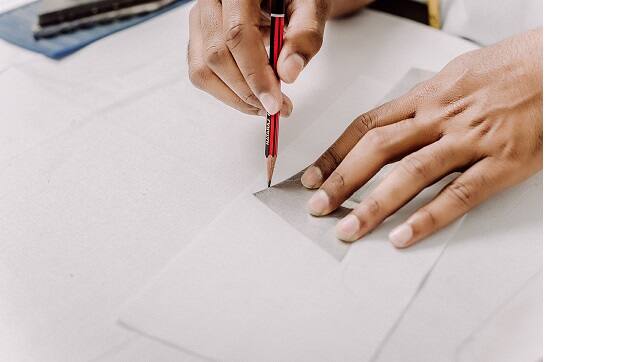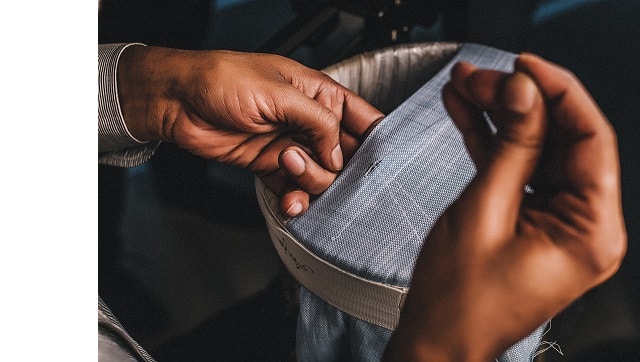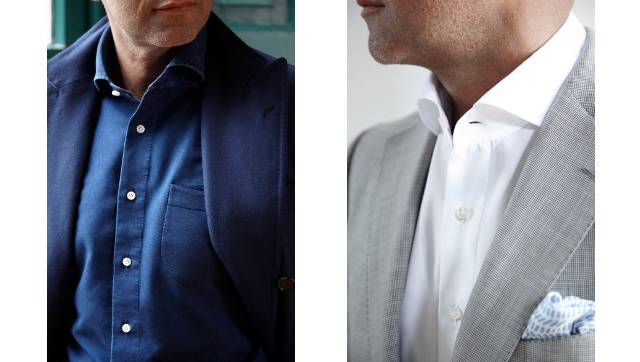‘Top Notch’ is a fortnightly column where journalist and editor Namrata Zakaria introduces us to fashion’s elite and erudite club. *** Who would believe that in the middle of the worst pandemic in recent global history, one that has made the world work from home practically in pyjamas for over a year, an Indian shirt-making company would win the best shirts tag in an international business magazine? How thrilled we were to find 100 Hands, an Amritsar- and Amsterdam-based boutique shirt company, make Robb Report’s Best of the Best list, considered by most to be the ultimate accolade in luxury. 100 Hands is merely seven years old. It’s run by a husband-wife duo, Akshat Jain and Varvara Maslova, who worked so well together at an investment banking firm in The Netherlands they decide to start their own business and lives with each other. Akshat already hailed from a business family that made yarn in Amritsar. “But it was a joint family enterprise. There were too many uncles and cousins in the office and there was no space for me,” he smiles. “So, Varvara and I decided to start something of our own taking off from there. The yarn business anyway had become a penny-margin industry.” “India already had so many wonderful hand-making skills, we couldn’t just let them die out. We wanted the world to see how special Indian crafts were,” Varvara echoes. The couple is honest in saying shirt-making wasn’t their love, it was just a business plan that became their passion only later. [caption id=“attachment_9764811” align=“alignnone” width=“640”]  Collar making by hand at 100 Hands[/caption] [caption id=“attachment_9764821” align=“alignnone” width=“640”]  Each buttonhole made by hand takes over 45minutes[/caption] 100 Hands is headquartered in Amsterdam, but all the shirts are made by hand in their Amritsar factory. Starting with just a team of 18 workers, they now employ more than 300. They say it takes 50 people (hence 100 Hands) 34 hours to make one shirt, and that’s the laborious process they have built their cred on. They import material and accessories from the top providers globally (thread from Germany, hand-rolled buttons from Italy, denim from Japan) but the shirts are all hand-stitched in India. Their buttonholes for example, are made painstakingly by hand, with as many as 25 stitches per inch (SPI), while most luxury labels make up to 18 stitches per inch. It’s easy to see why they make the most expensive shirts in the world (Rs 25,000 to Rs 75,000 a pop) and enjoy a cult status in Europe and the US. Sachin Tendulkar is a regular customer, as is The Netherlands football team. 100 Hands doesn’t only promote sustainability of a craft by keeping a hand-making technique going, they also ensure they follow fair trade practices as per international standards. “We don’t pay a minimum wage, but a fair living wage,” Akshat explains. “We are audited by a Dutch company that checks on us every six months to ensure we follow international standards, not just Indian standards. An employee begins his first day with us at a salary a little higher than the others. This way we ensure he stays with us, especially since we spend time training him up in international styles and maintaining global standards. Moreover, ours is a luxury product. We gain motivation and support from them, and they work better when they are paid better.” 100 Hands also provides for a seamless private bus service as well as medical insurance for all their employees. [caption id=“attachment_9764831” align=“alignnone” width=“640”]  It takes 50 people (hence 100 Hands) 34 hours to make one shirt at the label[/caption] The company also has more women employees than men. This is rather incongruous, as one always imagines a tailor as a male, in India and abroad. “Most tailors have been male only because of socio-cultural reasons. Men traditionally have gone to work while women have been taking care of the house. But thankfully this is changing. Women, in fact, make better shirts especially as their fingers are thinner and more nimble,” Akshat says. The couple is enthused their business has been resilient in the pandemic. “We make classic shirts but also knit-based jersey shirts and denim, which are a little more casual luxury. Most of our customers wear a shirt at home too, maybe without a tie or jacket.” Selling India to the world has not been easy, more so since the finest handmade tags came out of France and Italy, and the finest shirts and bespoke tailoring out of Jermyn Street in London. Akshat’s favourite story is how the team at Isetan, the renowned Japanese department store, got up from their seats and applauded when they were first introduced to the 100 Hands shirt. He says the time is always right for a high-quality, well-made product: “Indians have always made beautiful products. We have just not marketed them well.”
100 Hands, a boutique shirt company run by husband-wife duo Akshat Jain and Varvara Maslova, made Robb Report’s Best of the Best list, considered the ultimate accolade in luxury.
Advertisement
End of Article


)
)
)
)
)
)
)
)
)



